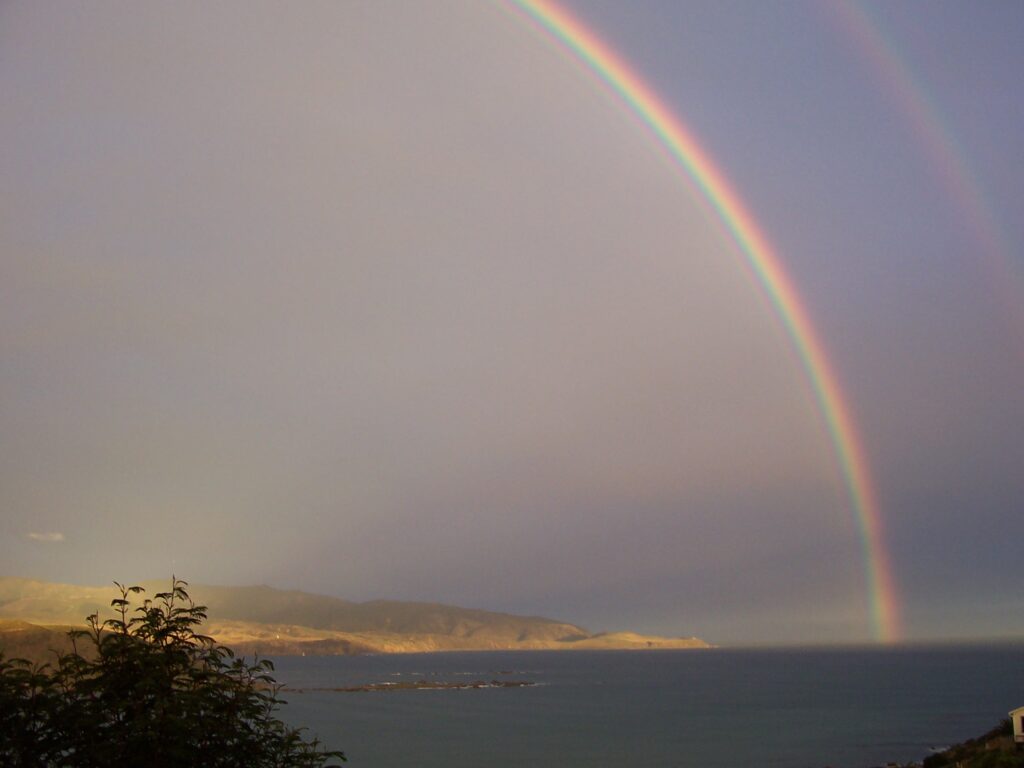Valuing All Languages
(How to seek the wisdom in any language)
This page is not only about evaluating the sustainability of our human languages. It is about enjoying the beauty and compassion in any language, conserving its wisdom and learning from it so we can better ensure our mother-tongue is transcendent.
Often a language that is indigenous to a region reflects~~generates the wisdom accumulated over many millennia of living in a compassionate (sustainable) relationship with the local land, waters and air. This wisdom may be critical to the liberation and re-invigoration of ego-driven cultures that are imploding in division, violence, delusion and hopelessness.
This page forms an ongoing diary of my attempts to learn from another language (to reo Maori) so my use of the English language works to rectify its dualistic, divisive, exclusive nature and enable it to become a more compassionate, holistic, inclusive (transcendent) force in our world.
(7 June 2025)
Reflections on our English notion of conspiracy and the Maori experience of “the hongi”
(16 March 2025)
One human being’s awakening to his mother-tongue (English) inspired by another tongue (Te Reo Maori)
( 2019 article)
Te Reo Maori Tino Ataahua (The Most Beautiful Maori language)
Reflections on our English notion of conspiracy and the Maori experience of “the hongi”
The Power of the Breath
Our breath is our most wonderful friend and wisest teacher if we attend to it in compassionate way. It accompanies us from the moment we are born and throughout every moment we exist in this human formation, dancing and singing with us, reminding us we exist amidst the rhythms of the continuous universal transformation, informing us in trust each time we exhale, renewing us each time we inhale and just being with us at all times whether awake or asleep.
Our breath is our ultimate teacher in that every cycle forms an intimate, vital exemplar of how we are paradoxical beings while simultaneously being able to transcend our paradoxical condition.
For instance, we live the paradox that our whole body enacts every breath while the lungs remain passive in the respiratory process.
For instance, we live the paradox that it is our capacity to give our breath away to the universal potential that enables new sustaining potential to be manifest in us. To give is to receive.
In other words, we exist in this form while we enjoy the ability to generate a void for us to exist in. Put crudely, we exist as this human formation while we can generate a relative vacuum for the universe to re-inform in balance and harmony with all.
Crown English notions of the Breath
Half a century ago I encountered a book by an Englishman who lived many years in India studying the science of Yoga – practicing “union” , yoking” (with the Supreme Spirit), from PIE root *yeug- “to join.”
( etymonline.com).
The rulers of Indian subcontinent ( the City of London merchants aka The Crown) observed and envied the extraordinary vigour, discipline and health of the yogis compared to that of their own troops.
Noting how mastery of the breath was fundamental to yogic practice, The Crown determined to instill this “discipline” into their military culture. However, as both the geological records of the Earth and the collective experiences of a vast array of cultures around the planet attest, the Anglo Empire is founded in unprecedented brutality, greed and extraction.
We are our language and accordingly their military drill reflected this extreme acquisitive culture as in the order “Stand to attention! Chests out! Chin up! Take a deep breath! Hold it!”
Thus we have the phenomenon to this day of soldiers keeling over in dead faints when they are stood to attention for extended periods.
This exhaustion is viewed as proof of their military compliance and disciple.
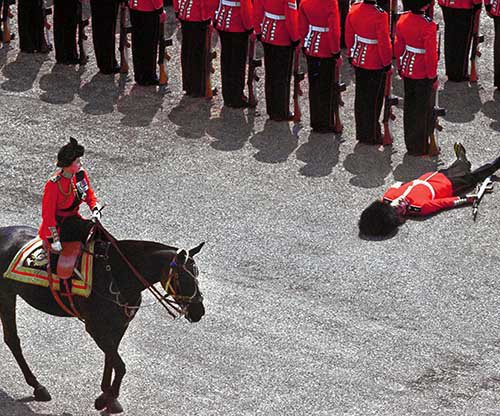
This fatal, acquisitive delusion about the physics of the breath is now endemic in the wider Crown culture, including our medical and pharmaceutical industries. Such extreme psychosis reflects~~ generates much needless misery and alienation.
Etymology of “Conspiracy” and Interrelated Words
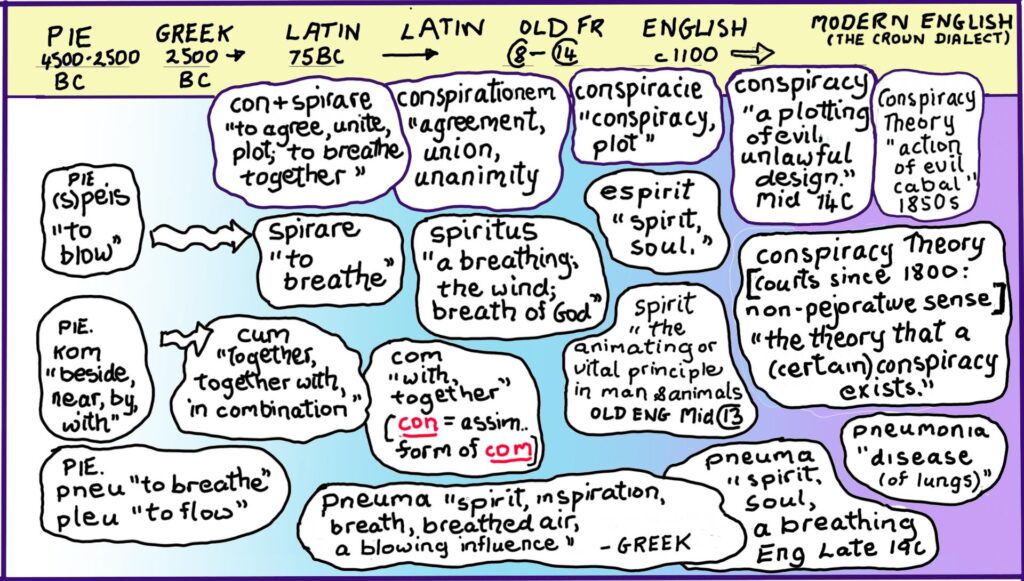
Observe how the meaning of all these words has become less transcendent (compassionate) and more exclusive (ego-derived) this past four centuries.
The word “plot“, once a transcendent word, is also now increasingly associated with malignancy since 1605 – the year of the so-called “Gunpowder Plot” in London.
Nga mihi nui (many thanks) to https://www.etymonline.com/search?q=conspiracy
Hongi – Conspiracy
Preface note: It is my privilege to have been born in Aotearoa here in the South Pacific Ocean. However our dominant Crown English media inculcated me in poor regard, disdain and even unwitting hostility to te ao Maori (The world of Maori ).
It is my search for sustaining meaning in my mother-tongue (The Crown dialect of English) these past few decades that has offered the little insight I have into the profundity of the “hongi”. My comments come from a place of ignorance and are possibly very flawed.
The “hongi” is a profound greeting between two Maori people acknowledging the sacred in each other and, fundamentally, celebrating creation, the breath or force of life they share.
Two people, when greeting each other, perform the hongi by gently pressing their noses and foreheads together to acknowledge and share their collective breath (spirit) and to offer respect for each other’s knowledge and wisdom.
Photo of a hongi c1913
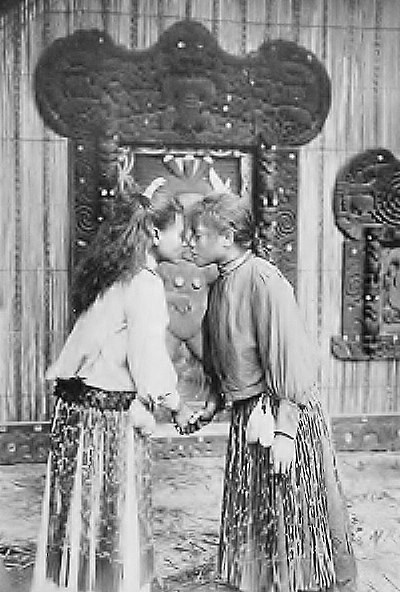
The “hongi” is a profound greeting between two Maori people acknowledging the sacred in each other and, fundamentally, celebrating creation, the breath or force of life they share. Two people, when greeting each other, perform the hongi by gently pressing their noses and foreheads together to acknowledge and share their collective breath (spirit) and to offer respect for each other’s knowledge and wisdom.
The practice of the hongi is found in Polynesian cultures on many islands across the Pacific Ocean, each having its own legends of its origins and meanings. These may vary with different iwi (tribes) on an island.
Some legends speak of “Io Matua Kore, the God and Creator of this universe who gave man the first breath of life”.
Other legends speak in terms of Tane, the god of the forests and birds who had the strength to separate Ranginui (Sky Father) and Papatuānuku (Earth Mother) to allow light to exist between them. ( Life, as we know it, could not exist before then. This action enabled photosynthesis and the flourishing of all manner of forest life. This, in turn, generated the vital, exquisite oxygen flows and balances in Earth’s atmosphere required to sustain Mankind.)
Some say Tane became lonely, especially as he witnessed how other creatures had the capacity to procreate. So he fashioned the first woman from the earth and breathed life into her nostrils. Hence the proliferation of plants, trees, insects, animals and fish on our planet.
So while legends may differ across the Pacific, the word “hongi” shares a common meaning: the word “ho” involves the exchanging, sharing, celebrating the breath of life while the word “ngi” expresses the acceptance of that gift we give each other.
My interpretation is that the ritual of the hongi expresses compassionate meaning and purpose derived from these deep, ancestral, existential legends. The hongi forms a profound reminder and affirmation in gratitude, generosity, sharing, humility, trust, hope, unity and harmony with all.
End section reflecting on conspiracy and the hongi.
(One human being’s awakening to his mother-tongue (English) inspired by another tongue (Te Reo Maori)
16 March 2025
Ko Dave McArthur ahau. (My name is Dave McArthur)
I am born and bred on the Maori lands of Aotearoa (AKA New Zealand). Throughout my formative years our Crown media (schools, universities, broadsheets and radio) powerfully inculcated me in deep disdain and disinterest of the language of the indigenous Maori culture.
This said, I grew up surrounded by legendary Maori names such as Waiorongomai, Ratanui, Ruamahanga, Tauherenikau (rivers), Remutaka, Tararuas (forested ranges of hills containing rimu, rata, kowhai, kawakawa, rangiora and many other indigenous trees), Wairarapa, Onoke, Pounui (lakes) and all these names evoked such a sense of poetry and spirit of place in me that something deep in me sensed my life was missing a magical realm.
This sense of wrong and loss was to be amplified when I lived in the abattoir camps as a young man and listened to Maori colleagues dating their lives as before and after “Maori (culture) died”
My “language” teacher at college dismissed my request to learn the Maori language and instead offered Latin as a third option after French. So I was into my 8th decade before I received formal tuition in te reo Maori in 2019.
Then, the week before NZ Covid “Lock-down” in 2020, my local hospital informed me my body had inoperable, metastisized cancer. So my focus since then has been to attempt to summarize the insights of my endeavours this century to generate a science in the communication of climate care, which has included constructing this new website with my puny skills – an endeavour that has its own time and involves significant amounts of my psychic energy.
Learning te reo Maori in 2019 was a liberating experience as this indigenous language opened up a wonderful, generous worldview that brought the universe to life in unexpected ways that my Crown English never did or could.
It taught me to better care for my mother-tongue so it too could become more transcendent and sustainable.
It encouraged me to seek out and learn the truths of my Scottish, Irish and English ancestry for the first time in my life.
It confirmed in most hopeful way the hypothesis that information being physical, we are our language and it too is subject to the principles of physics.
My escalating ailments throughout 2019 made it a difficult time. However it was also a time of elation because the classes afforded me an exhilarating glimpse into the sustaining power of transcendent language and I managed to express that in a few cartoons for my tutors.
Sometimes we are oblivious to the simple, wonderful truths in what we say in our mother-tongue.
The following section contains the content of the Te Reo Maori page I created in 2019 on the truehope.info website. It is a formation of hasty jottings and adapted cartoons attempting to share that visionary glimpse of how we can all better enjoy transcendent(sustaining, holistic, compassionate) languages, especially in an age when our Crown dialect of English is designed to suppress other cultures and languages and could even destroy Mankind*.
*See, for example: charts at A Word in History at a Glance and experiment at ChatGPT at Our Peril
Please note: the above statement is not oikophobia – quite the contrary because careful reading of this website reveals it is all about caring for our mother-tongue and ensuring compassion prevails in our lives. As the Maori proverb says, “ka mua, ka muri” – we walk backwards into the future. Being informed in our ancestors we can know who we are and this information can inform our future for the better.
End of introduction to next section.
Te Reo Maori Tino Ataahua
(The Most Beautiful Maori language)
Ko taku teo reo taku ohooho, ko taku teo taku mapihi mauria
Whakatauki (Maori Proverb)
My language is my awakening, my language is the window to my soul.
This year, 2019, I am privileged to attend lessons in the Maori language at our local community school. The lessons are provided in most kind and caring ways by the staff of Te Wananga O Aotearoa.
Here are some of my first reflections on the beauty and insights residing in te reo Maori.
He aha he ataahua? What is beauty?
It is my experience that beauty is most manifest in moments of great connection, harmony and compassion with all.
In such moments we are better able to transcend paradox and be most truthful in and of the universal potential. When this is so, our life, including our language, most reflects and sustains the universal flows and balances that enable humankind.
Salvation in wonder and inquiry
Pictures can transcend paradox and communicate this beauty in ways words and our thought process never can. In August 2017 I survived open-heart surgery and thus embarked on a cartoon journey searching for the spirit of wonder and inquiry I enjoyed as a 12-year-old. I came to realize it is only this precious state of being that can save humankind from self-destruction.
These initial reflections on the beauty of te reo Maori are based on the draft cartoons that arose in that journey of exploration.
Whakatauki (Maori Proverb) The power of language
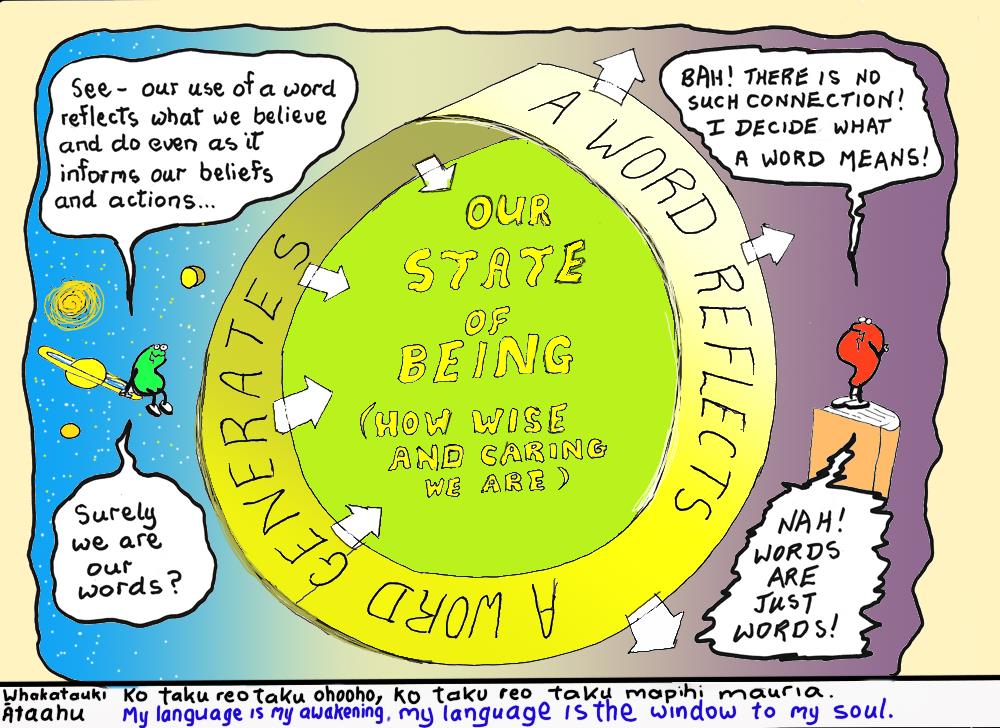
Existence being paradox, any form in the continuous universal transformation is simultaneously informs all other forms even as it is informed by all other forms.
This means our every thought, spoken or unspoken, is a force acting on and reacting to the universal forces.
In other words, all information, including our language, is physical. Being physical, our use of language tends to sustain us to the extent it is in accord with the great principles of physics.
Our modern English language tends to be dualistic, tending to trap us in paradox. It is a profound denial of the principles of energy and thus our use of it tends to generate vast waste, pollution, ugliness and misery.
This proverb of the Maori language beautifully embraces and transcends the paradox of language. It speaks of the awakening and the revelation of our state of being in the same breath, thereby reminding us we are our language. Thus our words and behaviour are more in harmony with all and tend to conserve the flows and balances that sustain humankind.
Note:
“Mauria” does not translate directly as “soul” or “spirit”. It more refers to our experience of “life force”.
“Mapihi” does not translate directly as “window” (matapihi). Rather it may suggest our language is a way of knowing the truth or state of our mauri.
Kaiako Student Teacher
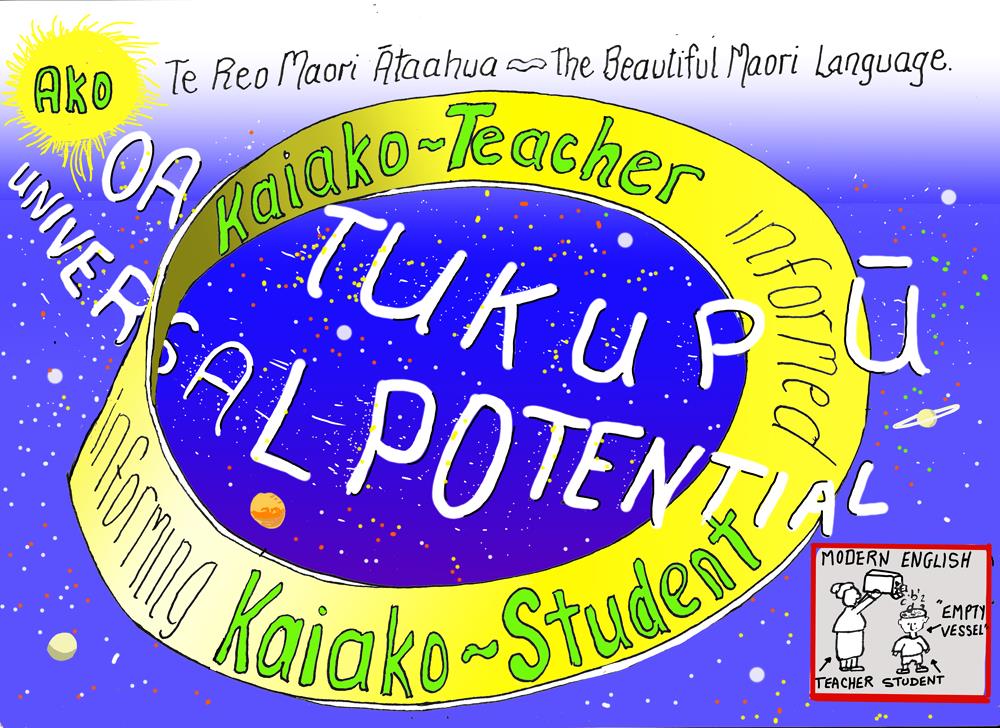
Existence being paradox, learning is teaching and teaching is learning, the teacher the student, the student the teacher, the answer the question, the question the answer. It is the true spirit of inquiry that sustains humankind and this spirit most flourishes in our children. This is because all children are born into compassion, a considerable state of science. The ego has not yet developed the sophisticated self-deceits and ingenious rationales of denial that come with adulthood.
On balance our English education system is ego-driven, the language of its framework being hostile to compassion. The student, especially the child, is viewed as an “empty vessel” to be filled by the “know all” teacher. The prime measure of the system’s success is its measure of the skill of its graduates at regurgitating knowledge. This system is without care of how knowledge is used – it has no true measure of the sustainability of the language and lifestyle of the graduate.
“Ako” in te reo Maori is more holistic in that “kaiako” transcends the teacher-student paradox. This is reflected in the belief the child comes rich in the wisdom of the ancestors, wisdom that informs our language and lifestyle so these conserve the flows and balances of Earth that will sustain generations yet unborn.
Ia – Him Her He She
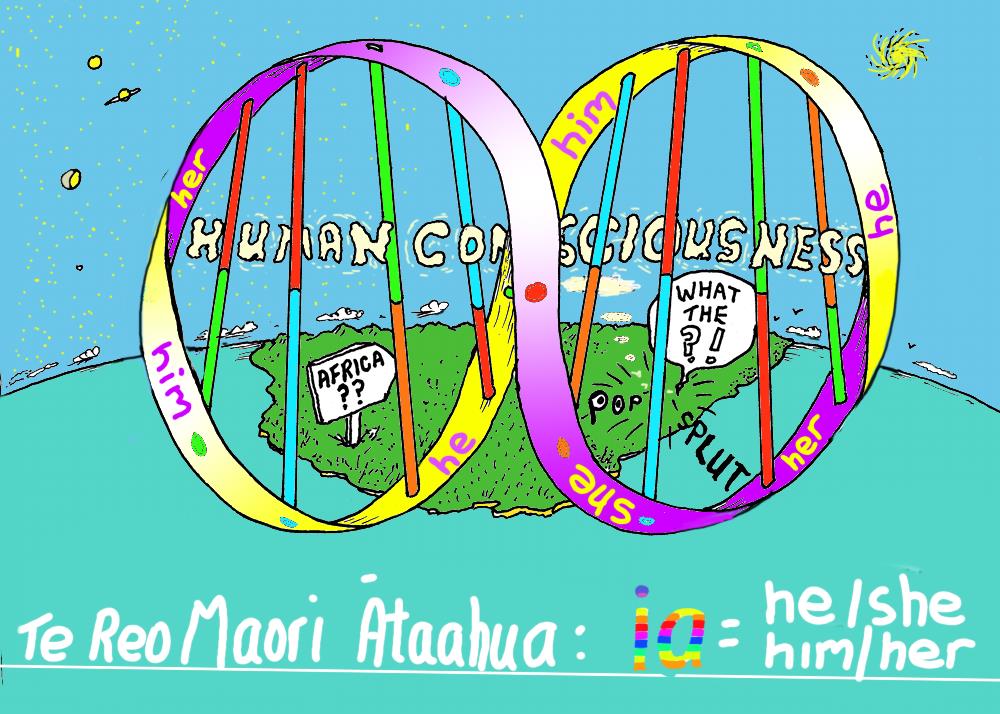
Existence being paradox, both the human ego and compassion arise in any moment of self-awareness. The force, which is the ego, thrives in division and exclusiveness whereas the force, which is compassion, flourishes in connection and inclusiveness.
We all live the great paradox: the invariable (constant) universal change (transformation).
So it is the sexual nature of us all is about the begetting and the stilling, the creation and the extinction, the fusion and the separation of the elements of all forms of life.
The knowing of this physics is in the DNA of every cell and it has been so since the first cell arose perhaps 3.8 billion years ago on Earth. This information has sustained life forms with all their diversity through eons of climate change. It means we human beings are asexual even as we are sexual. Each of us is male even as we are female. We are one and the same even as we are unique and different.
The language of modern English is more ego-driven and less compassionate. This is reflected in the fact it has no common pronoun that transcends the paradox of our masculinity and femininity. English culture lives and generates a divisive, dualistic world of him or her, his or hers, he or she.
The language of Maori is less ego-driven and retains greater compassion. This is reflected in the fact it has a very common pronoun that transcends the paradox of our masculinity and femininity. The pronoun is “ia”. Thus the language of Maori better reflects and generates our greater humanity. It is more holistic. It is better able to reveal and express the great wonder and beauty of all life in all its diversity.
Tangata – to be a human being, person, individual
Taangata – people, persons, human beings
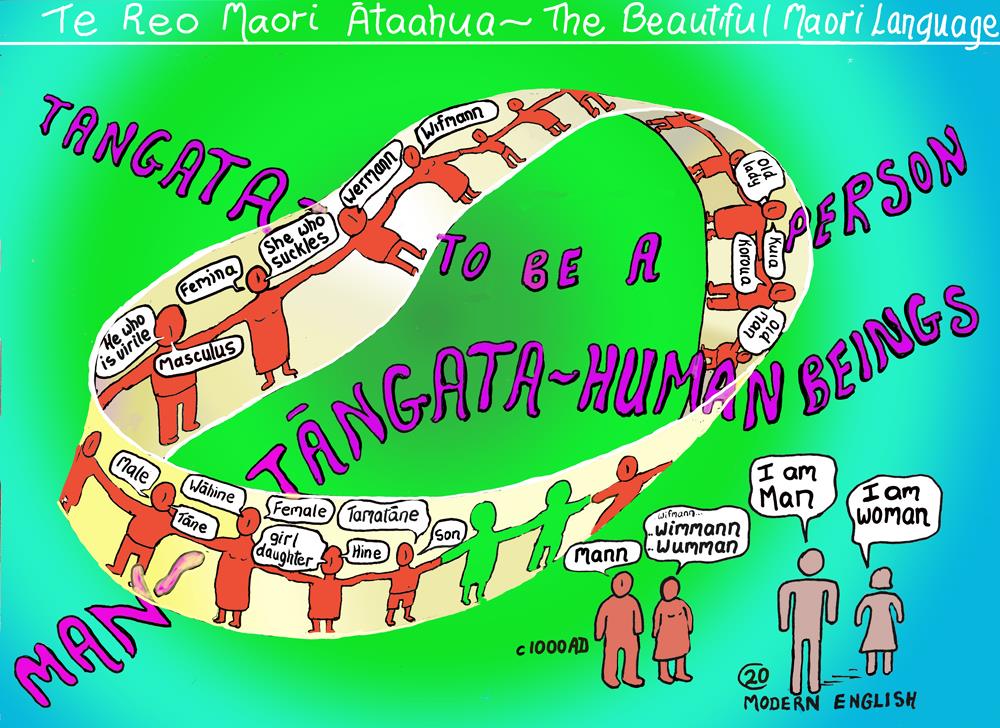
Existence being paradox, our use of a word simultaneously reflects and generates our state of being.
Existence being paradox, all forms in the universal transformation are the same even as each form is unique. We live a dance between the unique and the universal.
Without compassion, the ego tends to have us confuse and conflate the universal and the unique in unhelpful ways. Greed and arrogance prevail so that our behaviour tends to generate misery rather than harmony.
The origins of the word “man” are unclear. It may have arisen from profound myths of the progenitor of the human species such as the Germanic god Mannus and the Indian god Manu with the word “human” reminding us we are earth dwellers -we arise from and return to humus, the soil, the earth.
Until the 19th Century “man” was a relatively compassionate word in that it was inclusive of all human beings. Victorian England adopted and adapted Darwin’s notion of evolution into the belief that “Man” is the pinnacle of evolution, some even believing “Man” is above and beyond the principles of physics. Then, in the 20th Century, a class of English male “homo sapiens” appropriated the potent word “man” as their exclusive description.
Similarly they transformed “homo” into word of abuse for a minority of males.
Similarly they conflated “female” with “male” and “woman” with “man” in ways that derogate the femina of our species on a global scale.
This divisiveness and derogation is consistent with a more extreme ego-driven use of the English language.
The language of Maori evidences a far greater degree of compassion in that it has words to describe the unique elements of a human being while being careful to conserve the inclusiveness of words that express our universal nature. In particular it has two words – spoken as “tangata” and “taangata” – to express our common humanity. Spoken “tangata” refers to the individual state, which is a human being while the spoken “taangata” (‘a’ with a macron) refers to people, persons and the universal state, which is human beings. Thus again the language of Maori is more holistic and better able to express in our daily lives the great wonder and beauty of life in all its diversity. Any attempt to translate “tangata” into modern English destroys its vitality.
Aroha – Compassion
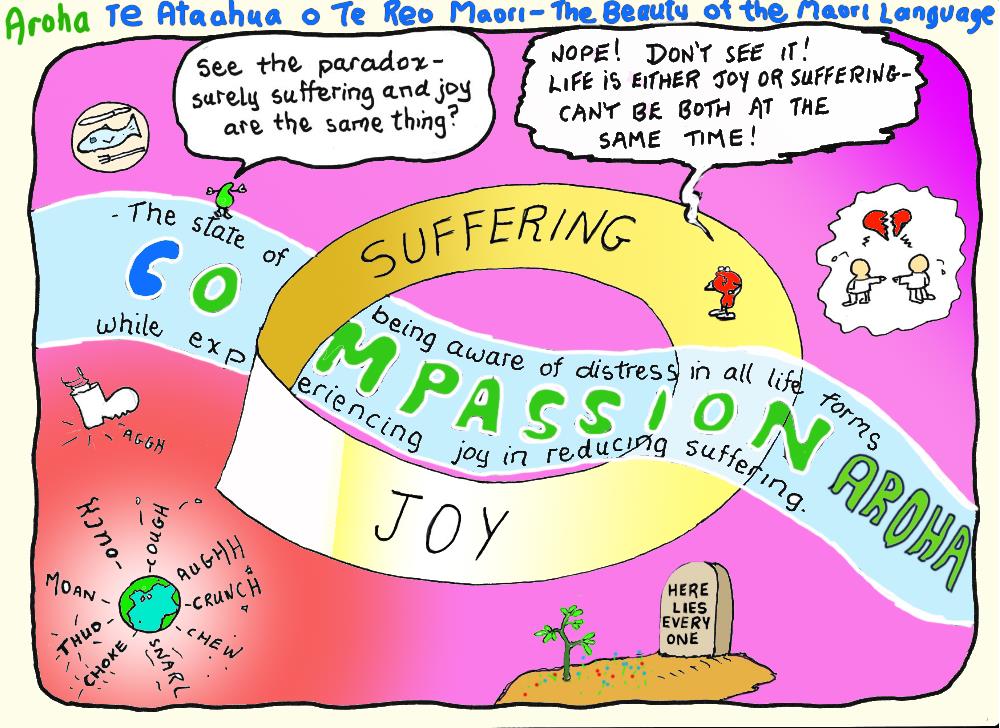
Existence being paradox, the ego (the “I”) and the compassion of a human being are of each other even as they are unalike, different. Both these complementary states of being arise in every human in any moment of self-awareness.
Born of this division of our awareness, the ego lives in profound denial of the universal reality, which is continuous transformation. This because the ego abhors any reminder of the finite nature of all forms, including the fact our human form is mortal.
We experience this denial of the ego as fear, greed and envy, as energy (time) deprivation and arrogance, as cruelty and exclusiveness, as dishonesty and delusions.
Compassion, by contrast, connects and reminds us in the universal reality, the vast, ever-changing, bounteous potential. We experience the acceptance of change that is inherent in compassion as honesty and trust, as sharing and inclusiveness, as generosity of energy (time) and reflection, as enquiry and wonder, and as humility and forgiveness.
Aroha is commonly translated as “love”. Modern English, especially as spoken in our ego-driven media, tends to equate love with sexual acts, “romantic” relationships and interpersonal attachments. “Love” is marketed as a commodity, countless singers of “love songs” blame love for their pain and the prevailing phrase is “I (the ego) love you.” So we “fall in love“, have “love affairs“, have a “love life”, get a “love life”, have “love seats”, write “love letters“, “make love” and have “love handles”. Love is typically symbolized as a heart.
Aroha is perhaps better understood as compassion, the complement of the ego. If “aro” refers to the seat of our emotions and “ha” to the breath, then aroha indeed reminds us in wondrous potential beyond words. The breath is perhaps our most vital and intimate experience of the universal life force. Our every breath connects us to all and refreshes us in the physics of giving and receiving. Aroha is the enjoyment of all the qualities of compassion with all our senses. It has the power to balance the forces of the ego. In so doing it enables us to transcend the paradox of the human condition and be sustained in the universal potential in beautiful ways. He ataahua. He hohonu.
Wa – Time Space
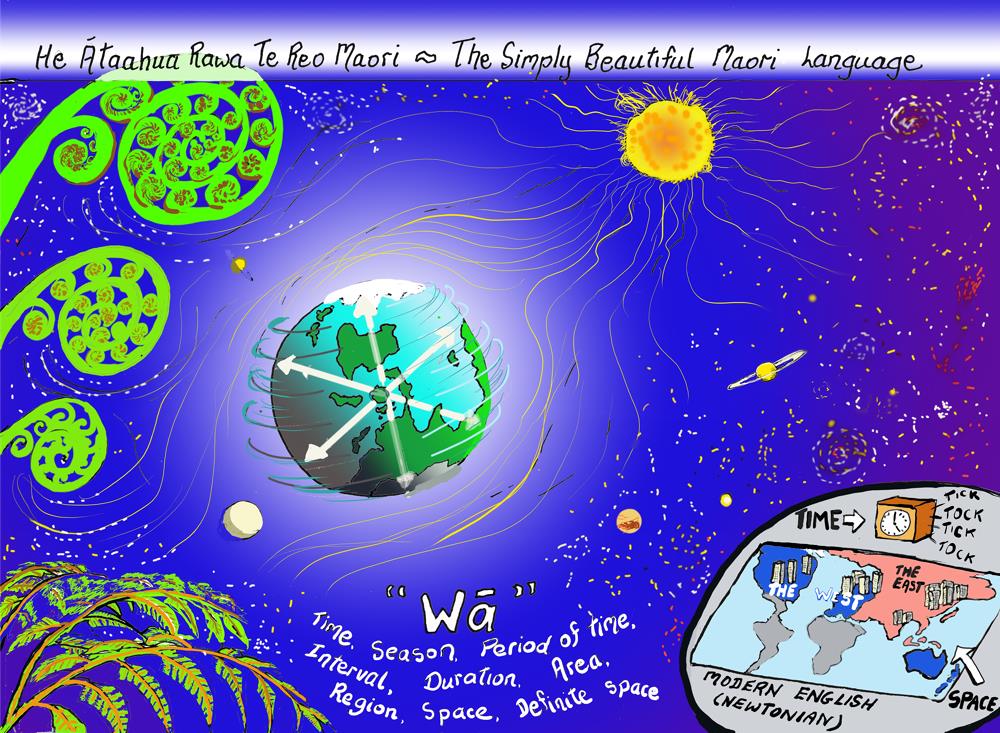
Existence being paradox, the measured and the measure are of each other. Perhaps our most vital measure is P = E/T where E (energy) is the universal potential, P (power) is the rate it is manifest and T (time) is our measure.
In New Zealand our “Western” educators are content if we can regurgitate this equation. They rarely teach us how we employ this equation at some level of our being with every heartbeat, every breath, standing up, sitting down, lifting a child, crossing the road, driving a car and all our other daily actions. It is critical to our survival – our flawed calculation of time and energy can maim and destroy us. Truly time is of the essence.
However we live a great paradox: each of us is vitally intimate with both time and energy; no one knows exactly what either time or energy is.
Over the past four or so centuries our European culture has become increasingly ego-driven and trapped in this paradox. This is reflected in the fact that time has been divorced from space and become a one-dimensional experience. So European behaviour tends to be more and more delusional and destructive.
During the past century European students of astrophysics and quantum physics (Einstein et al) have attempted to confront and correct this denial of reality by fusing three dimensions of space and one dimension of time into a four dimensional continuum, which they call “Space-time”. However a consensus persists in European culture that such ideas are irrelevant to our daily decisions and behaviour. Consequently the calculations and insights of quantum physics are used in perilous ways.
“Wa” means time, space, period, area, interval, region and season. This te reo Maori speaks of multi-dimensions and reminds us of their fundamental unity. The word “Wa” beautifully transcends both this great paradox of measure and the limitations of the ego. And in as much as it does so, it reminds us in harmony with all the flows and balances of the universe that sustain humankind.
Wahine – Woman
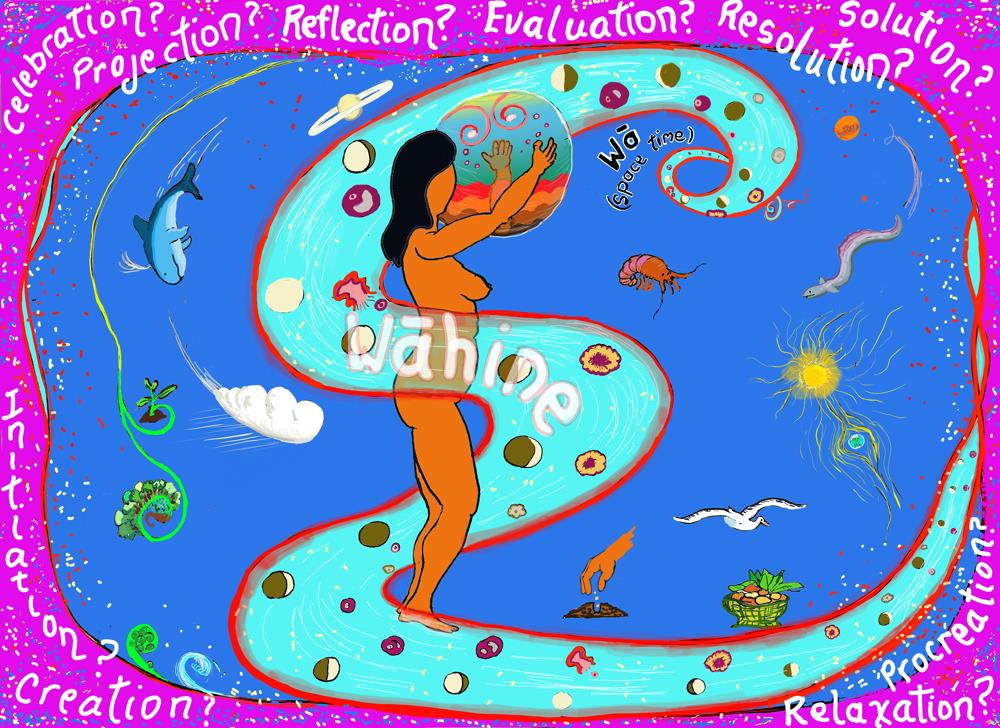
Existence being paradox, any form is informed by all even as it informs all. Anything, including a human being, is a temporary balance or equilibrium or homeostasis of information amidst the continuous universal transformation.
In practical terms, this means our potential to survive, whether as an individual or as a species, is very dependent on our capacity to experience a true sense of wa (space/time). It is our ability to enjoy a real sense of place that enables us to better conserve the universal flows and balances that sustain he tangata (the people).
Their language and history indicate Maori were finely attuned to the stellar, solar, lunar, tidal, winds and other flows of Te Moana-nui-a-Kiwa (the great Pacific ocean). Listen, for instance, to The Maramataka with Rereata Makiha in which Rereata discusses how the Māori Lunar Calendar or the Maramataka outlines the different phases of the moon and is a guide to the optimal days for fishing, planting or harvesting food. He also discusses the different names of the moon phases and how these also relate to human behaviours.
This potent, beautiful awareness of family, land, water, air and the stars, this sophisticated sense of wa is reflected in a profound respect for the role of women in our lives, as can be seen in the Maori description of them as “wahine” while younger women and girls are described as “hine”. The menstrual cycle with its periodic flows of red blood forms a potent reminder we are elements of the universal flux of carbon, iron and oxygen from supernovae – the cycles of wahine reflect and connect us to the cycles of our sun, our moon and our planet Earth to its core. We abuse their inherent wisdom at our peril.
Amended 23 September 2019
Science.

